On December 28, 1975, Cowboys QB Roger Staubach experienced a miracle. Trailing the Minnesota Vikings in the NFC Divisional Playoff Round, 14-10, Staubach threw a 50-yard touchdown pass. “I closed my eyes and said a Hail Mary,” Roger said. When he opened his eyes the pass had been caught by WR Drew Pearson and resulted in a 17-14 upset victory for the Dallas Cowboys. Thus, the term “Hail Mary pass” was born, referring to a last-chance, desperate pass.
Staubach’s Hail Mary is one of the greatest moments in Dallas Cowboys history and one that is immortalized throughout The Star in Frisco.
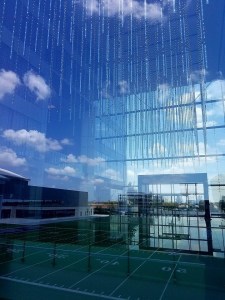
Part of Frisco’s $5 Billion Dollar Mile, The Star is a 91-acre mixed-use development created as a partnership between the Dallas Cowboys, the City of Frisco and Frisco ISD. This unique entertainment destination includes: a 200,000-square-foot shopping and restaurant district; Omni Frisco Hotel; Baylor Scott & White Sports Therapy & Research center; Ford Center at The Star; Tostito’s Championship Plaza where community and sporting events are hosted; Cowboys Fit, health and fitness facility; Cowboys Club, an exclusive, members-only club; and the Dallas Cowboys World Corporate Headquarters.
Encased in glass, the Dallas Cowboys World Corporate Headquarters shines like the sun. At night, a star glimmers from within the heart of the building.
That star is the Grand Atrium, a five-story cavernous space illuminated by Volume Frisco, an art installation created by Leo Villareal. The sculpture consists of over 19,000 dancing white LED lights embedded in 160 40-foot-long stainless steel mirrored rods suspended from the ceiling. It twinkles overhead. Underfoot, its reflection dances on the Italian marble floor where the names of the 21 members of the Cowboy’s Ring of Honor are engraved in shiny silver bars. The one for Tom Landry, the Cowboys’ beloved head coach for 28 years, has a place of honor near the entryway. Troy Aikman’s reads, “Being a champion starts with believing in a cause bigger than yourself. The team is always bigger than the player.”
Nearby, the Dallas Cowboys’ five Vince Lombardi Trophies stand, majestic yet unassuming. They are not enclosed in glass. They are not hidden behind a barrier. It’s not allowed, but there’s nothing stopping you from reaching out and touching one of the solid sterling silver football trophies that serve as a reminder of the Cowboys’ World Championship wins. Opposite these are the five Super Bowl Championship rings, each one more extravagant than the last.
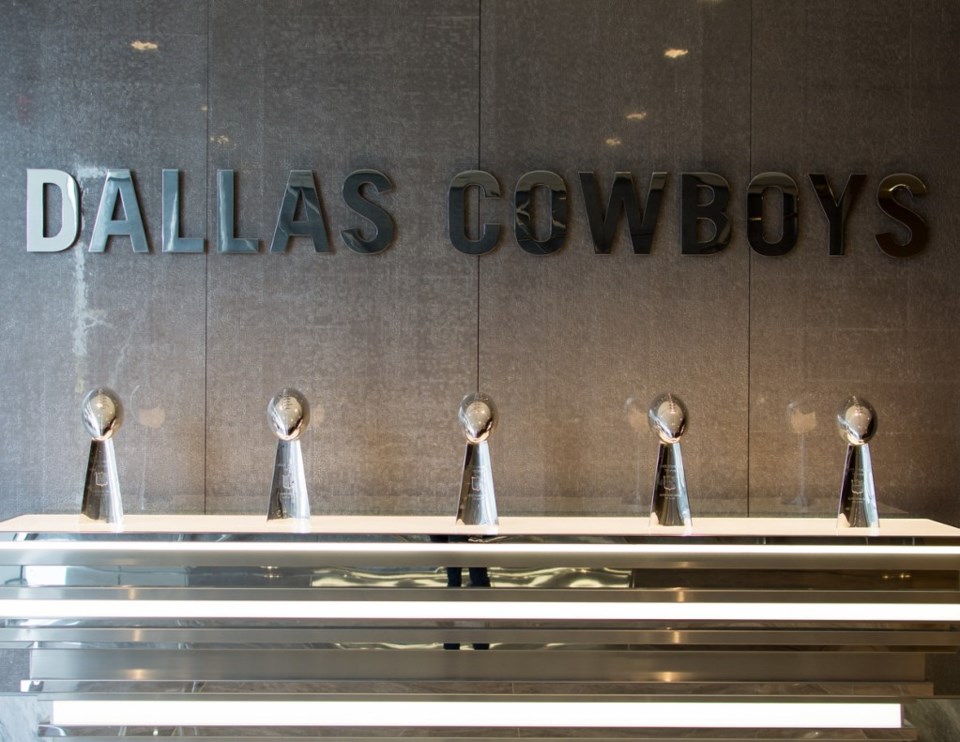
The Grand Atrium opens onto two practice fields; one is turf, one is grass, allowing the Cowboys to simulate conditions at competitor stadiums. The entire building, including corporate office space leased to private companies, overlooks this training area.
Their indoor practice field, a 510,000-square-foot athletic facility, at Ford Center at The Star, is the only NFL training facility in the U.S. that’s shared with a public high school program. When the players leave at midday it’s handed over to Frisco ISD’s varsity football teams. The turf is marked with the Cowboys’ logo as well as the Frisco ISD and City of Frisco logos.
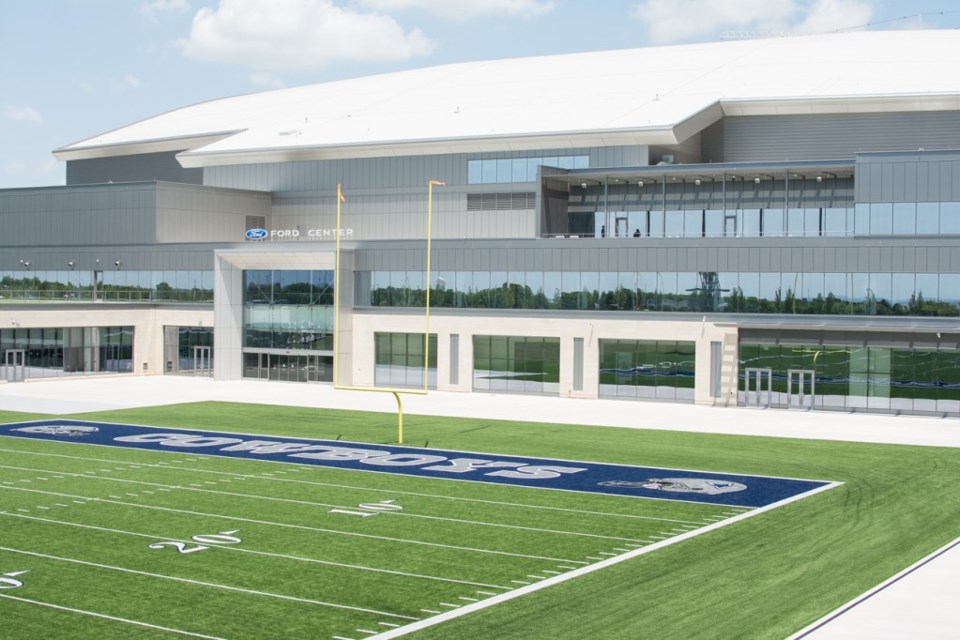
The Interview Room, where Coach Garrett addresses the press, has floor-to-ceiling windows and a podium with a digital board. The original press backdrop from Valley Ranch, the previous home of the Cowboys, has been restored and hangs on the wall surrounded by photographs of old press conferences.
The Dallas Cowboys TV Department produces shows in-house in a professional-grade studio, comparable in size to one at CBS11, which is the Cowboy’s broadcast partner. In an adjacent room, the personalities of DallasCowboys.com record radio shows, podcasts and broadcast live to web.
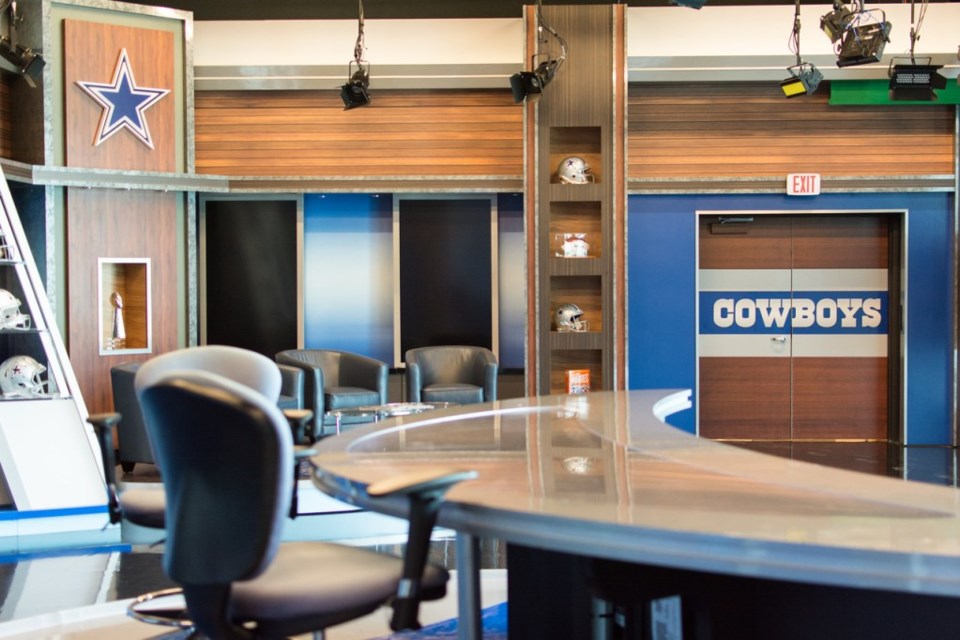
Emblazoned along the wall of the Cowboys’ corporate offices, the Nike Star Walk includes a display showing the evolution of the uniform since the 1960s and highlights the 10 most significant moments in the Cowboys’ history. Number 10 reads “2002: Emmitt Smith, NFL All-Time Leading Rusher”. It’s a record unlikely to ever be broken, although perhaps Zeke has other plans. Roger Staubach’s Hail Mary pass sits between Super Bowl XII and Super Bowl VI.
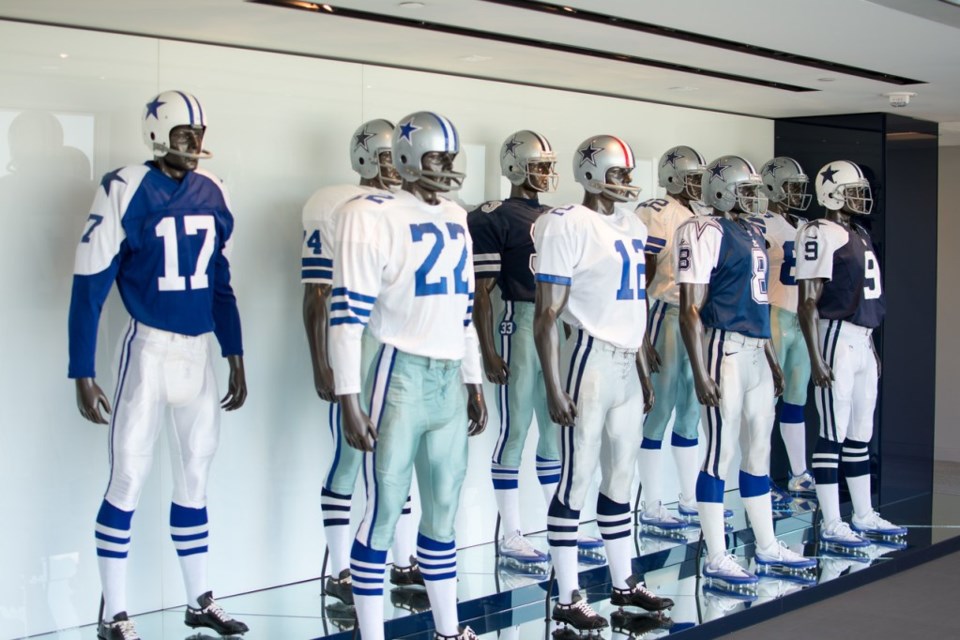
A little further on, that same Hail Mary pass is played out frame by frame in a photo series suspended from the ceiling. Outside, at the Dallas Cowboys Ring of Honor Walk and Dallas Cowboys Community Ring of Honor, presented by Dr Pepper, the numbers 12 and 88 are placed 50 yards apart in homage to that same game-winning pass. Located within the shopping and dining district of The Star, this installation will feature North Texas community leaders in a rotating showcase alongside the 21 members of the Dallas Cowboys’ Ring of Honor.
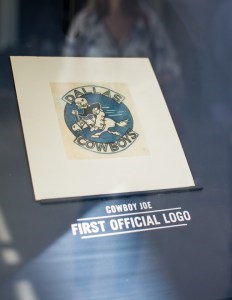
The team entrance, gym and locker room are all located at the northern end of the building. Motivational quotes and phrases are emblazoned at every turn. A quote from Jerry Jones stands opposite a wall filled with every team photo ever taken. “We need to win with class, and we need to win in a way that Dallas Cowboys fans are proud not only of the team, but of everyone associated with them.”
The Dallas Cowboys Training Table is where team players, coaches and all the support staff eat with a view onto the practice fields. In this area, a series of museum cabinets display artifacts from the past, many found during the move from Valley Ranch to The Star.
One cabinet shows Cowboy Joe, the Cowboys’ first official logo, as well as prototypes for the first brand mark: bucking bulls, cattle brands, pistols and a boot with a star-shaped spur. Another shows memorabilia from the Cowboys’ first ever game on September 14, 1960 when they played the Pittsburgh Steelers at the Cotton Bowl. One of the most precious items, “on loan from Bryan Adams and family”, is Coach Landry’s signature fedora.
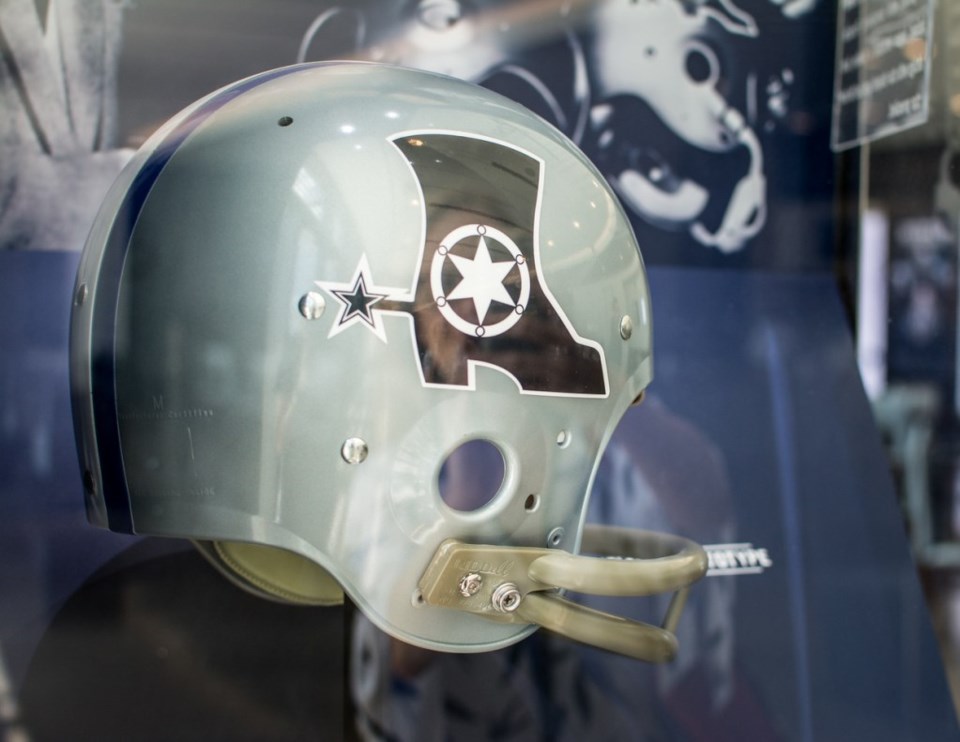
A plaque detailing how the Cowboys became a franchise hangs over the official paperwork:
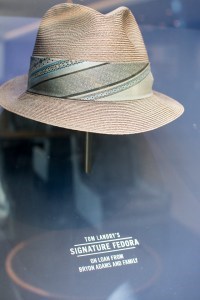
A major obstacle to Dallas’ effort to secure an NFL franchise was Washington Redskins owner George Preston Marshall, who held the monopoly over professional football in the South. At the time, the NFL required unanimous approval from team owners for expansion and Marshall refused to budge on his opposition stance.
Cowboys founder Clint Murchison, Jr. purchased the rights to the Redskins fight song, “Hail to the Redskins”, and denied the team permission to use it unless Marshall agreed to vote in favor of the Dallas franchise. Marshall finally relented, and so began an enduring rivalry.
At the entrance to the team meeting room, larger-than-life-size posters commemorate the Dallas Cowboys’ three NFL Men of the Year: Roger Staubach, Troy Aikman and Jason Witten. The Walter Payton NFL Man of the Year Award recognizes an NFL player for excellence on and off the field.
The team meeting room—a movie theater with plush leather seats—is where Coach Garrett addresses the team first thing in the morning. Bold white letters on both walls read, “THE TEAM. THE TEAM. THE TEAM.”
A touchstone stands at the entrance to the practice fields. Every player, member of staff and coach is expected to touch it on their way on and off the field. While on a tour, you can touch it too. Beneath the stone are the words of Coach Garrett, “It’s a privilege, not a right, to play, coach and work for the Dallas Cowboys.”
For the players, the motivations start as soon as they enter the building. At the player entrance, they’re greeted by an image of the five Super Bowl trophies as well as the quote, “We must win, we will win, win is the name of the game,” which Jerry Jones said in 1989 when he first purchased the franchise.
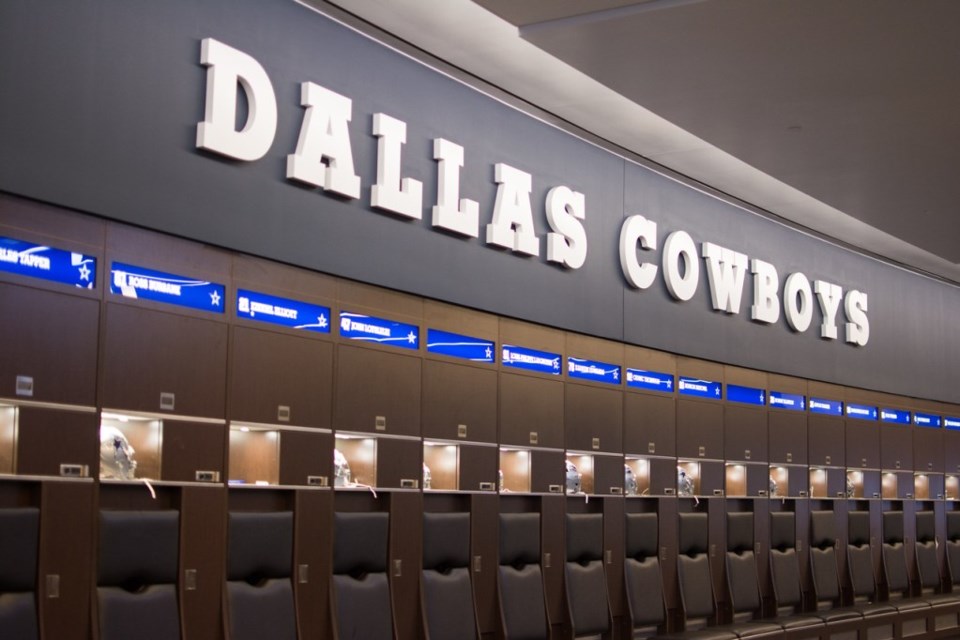
The Pro Bowl Wall recognizes every player who’s ever made a Pro Bowl for the Cowboys. That same achievement is highlighted in the football-shaped locker room where every Pro Bowl is indicated with a small star below the player’s name.
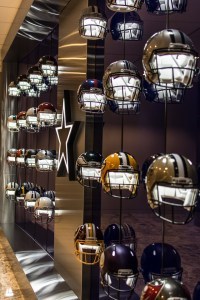
The Super Bowl Wall showcases team photos, programs, game stats, even the cost of a 30-second Super Bowl commercial—$86,000 in 1971 compared to $900,000 in 1995. It’s history the players see every day when they walk from training to the locker room to lunch.
The team marks their own victories on a weekly basis with a pair of boxing gloves and a hammer. The boxing gloves are awarded for the big knockout of the game, the biggest play—a big touchdown, catch or tackle, for example. The hammer goes to a special team player whose play allowed for a touchdown.
The Numerology Wall shows the Cowboys by numbers, such as 15 Pro Football Hall of Fame Members and five Super Bowl wins.
32: Playoff Appearances
8: Super Bowl Appearances
15: Pro Football Hall of Fame Members
7: Super Bowl MVPs
3: NFL Man of the Year Awards
5: Super Bowl wins: 1971, 1977, 1992, 1993, 1995
18,355 yards: All-time leading NFL rusher, Emmitt Smith
8: Most NFC Championship wins
21: Ring of Honor Members
20: Consecutive Winning Seasons (Most in NFL)
This summer with the induction of Jerry Jones into the NFL Hall of Fame, 15 will be updated to 16. In 2018, perhaps five Super Bowls will be updated to six. Go Cowboys!
Whichever team you cheer for, a tour of the Dallas Cowboys World Corporate Headquarters is an unforgettable experience for all football fans. VIP guided tours are available daily and can be booked at ticketmaster.com. Tickets are $32.50. Parking is free.
This article was originally published on September 20, 2017. It has since been updated.

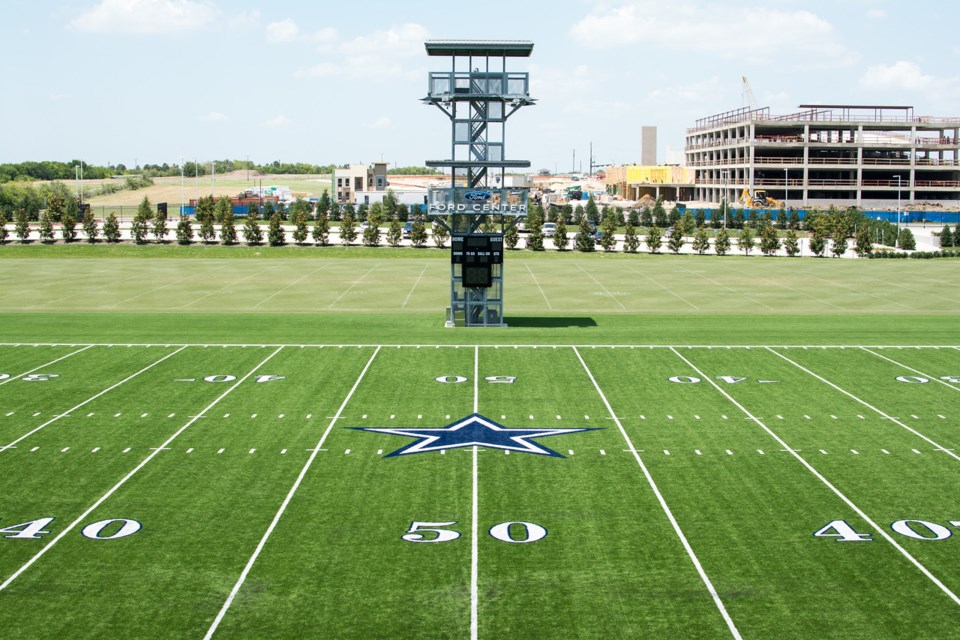

![Top 5 Reads Of The Week [April 7 - 11]](https://www.vmcdn.ca/f/files/localprofile/images/food-and-drink/localyokal.png;w=120;h=80;mode=crop)
